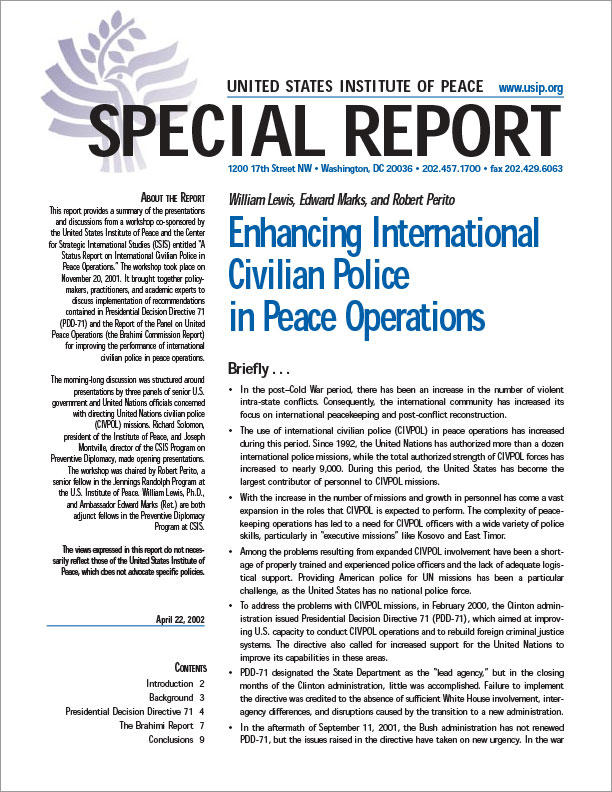In the post-Cold War period, there has been an increase in the number of violent intra-state conflicts. Consequently, the international community has increased its focus on international peacekeeping and post-conflict reconstruction.

Summary
In the post-Cold War period, there has been an increase in the number of violent intra-state conflicts. Consequently, the international community has increased its focus on international peacekeeping and post-conflict reconstruction.
- The use of international civilian police (CIVPOL) in peace operations has increased during this period. Since 1992, the United Nations has authorized more than a dozen international police missions, while the total authorized strength of CIVPOL forces has increased to nearly 9,000. During this period, the United States has become the largest contributor of personnel to CIVPOL missions.
- With the increase in the number of missions and growth in personnel has come a vast expansion in the roles that CIVPOL is expected to perform. The complexity of peacekeeping operations has led to a need for CIVPOL officers with a wide variety of police skills, particularly in "executive missions" like Kosovo and East Timor.
- Among the problems resulting from expanded CIVPOL involvement have been a shortage of properly trained and experienced police officers and the lack of adequate logistical support. Providing American police for UN missions has been a particular challenge, as the United States has no national police force.
- To address the problems with CIVPOL missions, in February 2000, the Clinton administration issued Presidential Decision Directive 71 (PDD-71), which aimed at improving U.S. capacity to conduct CIVPOL operations and to rebuild foreign criminal justice systems. The directive also called for increased support for the United Nations to improve its capabilities in these areas.
- PDD-71 designated the State Department as the "lead agency," but in the closing months of the Clinton administration, little was accomplished. Failure to implement the directive was credited to the absence of sufficient White House involvement, inter-agency differences, and disruptions caused by the transition to a new administration.
- In the aftermath of September 11, 2001, the Bush administration has not renewed PDD-71, but the issues raised in the directive have taken on new urgency. In the war on terrorism, CIVPOL can be a valuable tool in establishing the rule of law in post-conflict societies and preventing the growth of extremism.
- The United Nations has taken steps to improve its capacity to conduct CIVPOL missions. In August 2000, the UN's Brahimi Panel called for "a doctrinal shift" in the use of civilian police and other judicial and human rights specialists to reflect the increasing focus on strengthening the rule of law and respect for human rights.
- CIVPOL reform remains an important issue. It requires continued attention from administration policymakers, Congress, practitioners, and academics.
About the Report
This report provides a summary of the presentations and discussions from a workshop co-sponsored by the United States Institute of Peace and the Center for Strategic International Studies (CSIS) entitled "A Status Report on International Civilian Police in Peace Operations." The workshop took place on November 20, 2001. It brought together policymakers, practitioners, and academic experts to discuss implementation of recommendations contained in Presidential Decision Directive 71 (PDD-71) and the Report of the Panel on United Peace Operations (the Brahimi Commission Report) for improving the performance of international civilian police in peace operations.
The morning-long discussion was structured around presentations by three panels of senior U.S. government and United Nations officials concerned with directing United Nations civilian police (CIVPOL) missions. Richard Solomon, president of the Institute of Peace, and Joseph Montville, director of the CSIS Program on Preventive Diplomacy, made opening presentations. The workshop was chaired by Robert Perito, a senior fellow in the Jennings Randolph Program at the U.S. Institute of Peace. William Lewis, Ph.D., and Ambassador Edward Marks (Ret.) are both adjunct fellows in the Preventive Diplomacy Program at CSIS.
The views expressed in this report do not necessarily reflect those of the United States Institute of Peace, which does not advocate specific policies.